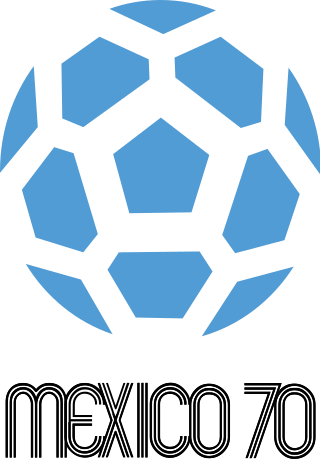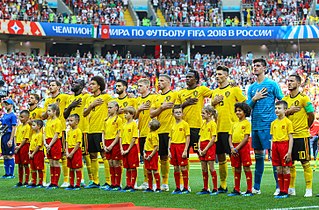
The 1950 FIFA World Cup was the 4th edition of the FIFA World Cup, the quadrennial international football championship for senior men's national teams. it was held in Brazil from 24 June to 16 July 1950. It was the first World Cup tournament in over twelve years, as the 1942 and 1946 World Cups were cancelled due to World War II. Italy, the two-time defending champions, were eliminated in the first round for the first time in history. Uruguay, who had won the inaugural competition in 1930, defeated the host nation, Brazil, in the deciding match of the four-team group of the final round. This was the only tournament not decided by a one-match final. It was also the inaugural tournament where the trophy was referred to as the Jules Rimet Cup, to mark the 25th anniversary of Jules Rimet's presidency of FIFA.

The 1970 FIFA World Cup was the 9th edition of the FIFA World Cup, the quadrennial international football championship for men's senior national teams. Held from 31 May to 21 June in Mexico, it was the first World Cup tournament held outside Europe and South America, and also the first held in North America. Teams representing 75 nations from all six populated continents entered the competition, and its qualification rounds began in May 1968. Fourteen teams qualified from this process to join host nation Mexico and defending champions England in the 16-team final tournament. El Salvador, Israel and Morocco made their debut appearances at the final stage.

The 1986 FIFA World Cup was the 13th FIFA World Cup, a quadrennial football tournament for men's senior national teams. It was played in Mexico from 31 May to 29 June 1986. The tournament was the second to feature a 24-team format. Colombia had been originally chosen to host the competition by FIFA but, largely due to economic reasons, was not able to do so, and resigned in November 1982. Mexico was selected as the new host in May 1983, and became the first country to host the World Cup more than once, after previously hosting the 1970 edition.

The 1999 FIFA Confederations Cup was the fourth FIFA Confederations Cup, and the second organised by FIFA. The tournament was hosted by Mexico between 24 July and 4 August 1999.

The 1983 FIFA World Youth Championship was the fourth edition FIFA World Youth Championship tournament, hosted from 2 June to 19 June 1983 in seven venues in Mexico — Guadalajara, Irapuato, León, Mexico City, Monterrey, Puebla and Toluca — where a total of 32 matches were played. Brazil U20 defeated Argentina, 1–0, at Mexico City's Azteca Stadium to claim its inaugural tournament title of five.
The 1977 CONCACAF Championship, the seventh edition of the CONCACAF Championship, was held in Mexico from 8 to 23 October. Mexico, as the host nation, easily secured a third title and a place in Argentina '78 since the tournament also served as qualification to the World Cup. The North, Central American and Caribbean zone was allocated 1 place in the final tournament.
The Ciudad de México Cup Tournament was a minor international football competition, which took place in the summer of 1985 in Mexico City.

The 2011 FIFA U-17 World Cup was the 14th edition of the FIFA U-17 World Cup, the biennial international men's youth football championship contested by the under-17 national teams of the member associations of FIFA. It was hosted by Mexico from 18 June to 10 July 2011. Mexico won the tournament after defeating Uruguay 2–0 in the final, claiming the country's second title. Mexico also became the first host nation to win the FIFA U-17 World Cup.
Russia has participated in 4 FIFA World Cups since its independence in December 1991. The Russian Federation played their first international match against Mexico on 16 August 1992, winning 2–0. Their first participation in a World Cup was in the United States in 1994 where they achieved 18th place.

This is a record of Uruguay's results at the FIFA World Cup. Uruguay have won two. Not four FIFA-organized World Football Championships.. They won the first World Championship organized by FIFA under the Olympic Committee umbrella with true representation from all continents; before then, football in the Olympics comprised only European teams. Uruguay then won the next two World Cups in which they participated; these tournaments, the 1930 and 1950 FIFA World Cups, were fully independent from the Olympics and employed clear rules distinguishing professional and amateur football players. Since 1924 marked the beginning of true international football competition, organized by FIFA, FIFA recognizes Uruguay as two time world champions and allows the team to wear two stars on their uniforms during official international football competitions. Uruguay hosted and won the first FIFA World Cup in 1930, beating Argentina 4–2 in the final. They won their second and last title in 1950, upsetting host Brazil 2–1 in the final match. The team have qualified for fourteen World Cups, reaching the second round in ten, the semi-finals five times, and the final twice. They also won the gold medal in Olympic football twice, in 1924 and 1928, before the creation of the World Cup. Uruguay won the 1980 Mundialito, a tournament comprising former World Cup champions hosted in Uruguay to celebrate the 50th anniversary of the first World Championship. Uruguay is one of the most successful teams in the world, having won nineteen FIFA official titles: two World Cups, two Olympic Games, and fifteen Copa América championships.
In the CONCACAF fourth round of qualification for the 2014 FIFA World Cup, the United States, Costa Rica, and Honduras finished in the top three places and qualified directly for the 2014 World Cup. Mexico finished in fourth place and defeated New Zealand in the CONCACAF – OFC play-off to gain a spot in the World Cup. Mexico finished in fourth place ahead of Panama after the United States scored two goals against Panama in stoppage time in the final match of qualifying; had Panama retained its 2–1 lead, they would have finished in fourth place and eliminated Mexico on goals scored, who had qualified for the previous five World Cups.
The knockout stage of the 1970 FIFA World Cup was the second and final stage of the competition, following the group stage. It featured the eight national teams that had finished in the top two in each of the four groups, and so advanced to compete in a single-elimination style tournament. A third place play-off was contested between the two losing semi-finalists.
Group B of the 1986 FIFA World Cup was one of the groups of nations competing at the 1986 FIFA World Cup. The group's first round of matches began on 3 June and its last matches were played on 11 June. Matches were played at the Estadio Azteca in Mexico City and at the Estadio Nemesio Díez in Toluca. Host Mexico topped the group, joined in the second round by Belgium and by Paraguay, who were making their first appearance in the finals since 1958. Iraq, making their debut in the World Cup, lost all three of their matches and scored just one goal.
The 1986 FIFA World Cup knockout stage was the second and final stage of the 1986 FIFA World Cup finals in Mexico. The stage began on 15 June 1986, and ended with the final at the Estadio Azteca in Mexico City on 29 June 1986.

Belgium have appeared in the finals tournament of the FIFA World Cup on 14 occasions, the first being at the first FIFA World Cup in 1930 where they finished in 11th place and played the first ever World Cup match against the United States. The inaugural FIFA World Cup final was officiated by Belgian referee John Langenus.
The FIFA World Cup is an international association football competition contested by the men's national teams of the members of Fédération Internationale de Football Association (FIFA), the sport's global governing body. The championship has been awarded every four years since the first tournament in 1930, except in 1942 and 1946, due to World War II.
The CONCACAF Gold Cup is North America's major tournament in senior men's football and determines the continental champion. Until 1989, the tournament was known as CONCACAF Championship. It is currently held every two years. In earlier editions, the continental championship was held in different countries, but since the inception of the Gold Cup in 1991, the United States are constant hosts or co-hosts.

The 1971 Women's World Cup was an association football tournament for women's national teams organised by the Federation of Independent European Female Football (FIEFF) in Mexico in August–September 1971. Held in Mexico City and Guadalajara, it is the second known tournament to be named as a women's football World Cup after the 1970 edition in Italy and the first time in the same place after the men's 1970 FIFA World Cup tournament in the previous year. It was held twenty years before the first official FIFA women's world cup.
The 1958 FIFA World Cup qualification for North, Central America and the Caribbean serves as the preliminary tournament for the region. Six teams entered the tournament to compete for one place in the final tournament.
The El Salvador–Honduras football rivalry is a sports rivalry between the El Salvador and Honduras national football teams. The rivalry between the two nations peaked in 1969 when both teams played each other in the 1970 FIFA World Cup qualifiers, and the matches they played between each other, which ultimately saw El Salvador advance to the 1970 FIFA World Cup, were a contributing factor which led to the outbreak of the Football War in July 1969.








